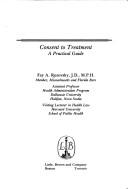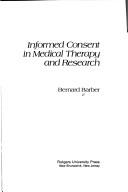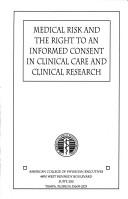| Listing 1 - 10 of 184 | << page >> |
Sort by
|
Book
ISBN: 2890735133 9782890735132 Year: 1984 Publisher: Cowansville, Qué. : Y. Blais,
Abstract | Keywords | Export | Availability | Bookmark
 Loading...
Loading...Choose an application
- Reference Manager
- EndNote
- RefWorks (Direct export to RefWorks)

ISBN: 0316760722 Year: 1984 Publisher: Boston (Mass.) : Little, Brown,
Abstract | Keywords | Export | Availability | Bookmark
 Loading...
Loading...Choose an application
- Reference Manager
- EndNote
- RefWorks (Direct export to RefWorks)
Book
ISBN: 1608050939 9781608050932 Year: 2011 Publisher: [Oak Park, Ill.?] Bentham eBooks
Abstract | Keywords | Export | Availability | Bookmark
 Loading...
Loading...Choose an application
- Reference Manager
- EndNote
- RefWorks (Direct export to RefWorks)
Obtaining proper patient consent in clinical care is vital in current times. The approach of 'doctor knows best' is now superseded by patient rights to make decisions. The approach of this book from the author's experience of 13 years in Clinical Risk Management with a special interest in generic consent is to combine different disciplines into a more unified approach that reflects every day practice, rather than citing individual examples of law case studies. By analyzing the elements of these different disciplines a more logical, practical and synergistic approach to consent is achieved. Thi
Book
ISBN: 1527526704 9781527526709 9781527511040 1527511049 Year: 2018 Publisher: Newcastle upon Tyne, UK : Cambridge Scholars Publishing,
Abstract | Keywords | Export | Availability | Bookmark
 Loading...
Loading...Choose an application
- Reference Manager
- EndNote
- RefWorks (Direct export to RefWorks)
Book
ISBN: 9780857009401 0857009400 9781849055208 1849055203 Year: 2015 Publisher: London Philadelphia
Abstract | Keywords | Export | Availability | Bookmark
 Loading...
Loading...Choose an application
- Reference Manager
- EndNote
- RefWorks (Direct export to RefWorks)
A practical guide for health and social care professionals on the Mental Capacity Act 2005, enabling more informed and effective practice.
Book
ISBN: 3456821557 Year: 1992 Publisher: Bern Huber
Abstract | Keywords | Export | Availability | Bookmark
 Loading...
Loading...Choose an application
- Reference Manager
- EndNote
- RefWorks (Direct export to RefWorks)
Informed consent (Medical law) --- Physicians --- Malpractice

ISBN: 0813508894 Year: 1980 Publisher: New Brunswick Rutgers university press
Abstract | Keywords | Export | Availability | Bookmark
 Loading...
Loading...Choose an application
- Reference Manager
- EndNote
- RefWorks (Direct export to RefWorks)

ISBN: 0924674644 Year: 1998 Publisher: Tampa Hillsborough Printing Company
Abstract | Keywords | Export | Availability | Bookmark
 Loading...
Loading...Choose an application
- Reference Manager
- EndNote
- RefWorks (Direct export to RefWorks)
Book
Year: 2002 Publisher: Brussel Vlaamse Raad voor Wetenschapsbeleid
Abstract | Keywords | Export | Availability | Bookmark
 Loading...
Loading...Choose an application
- Reference Manager
- EndNote
- RefWorks (Direct export to RefWorks)
Informed consent (Medical law) --- Ethics --- Moral conditions
Periodical
Year: 2014 Publisher: Oxford : Oxford University Press,
Abstract | Keywords | Export | Availability | Bookmark
 Loading...
Loading...Choose an application
- Reference Manager
- EndNote
- RefWorks (Direct export to RefWorks)
Psychiatrists have written much about the explosive expansion of scientific knowledge of the brain which developed over the late 20th century and the early 21st century. Comparatively little has been written within the field of psychiatry about the changes in society and world culture over this same period, and even less on the scope of psychiatric ethics that would account for these changes. Yet psychiatric ethics is an excellent framework in which to examine social changes in the field over the past 25 years, changes which are dramatic in nature and profound in impact. Some of these social changes include multiculturalism and its associated diversity of values; the transition to the digital era with its new demands on confidentiality, clinical boundaries, and privacy; the empowerment of psychiatric service users as full participants and co-producers of care; the development of new technologies of assessment and treatment, varying in their invasiveness and risk; the recognition of expanded social roles for psychiatrists, and the associated virtues of psychiatric citizenship; and the development of new practice models, settings, participants, and oversight, all of which represent profound challenges and opportunities for the ethical practice of psychiatry. The Oxford Handbook of Psychiatric Ethics is the most comprehensive treatment of the field in history. The volume is organized into ten sections which survey the scope of the text: (1) Introduction, (2) People Come First, (3) Specific Populations, (4) Philosophy and Psychiatric Ethics, (5) Religious Contexts of Psychiatric Ethics, (6) Social Contexts of Psychiatric Ethics, (7) Ethics in Psychiatric Citizenship and the Law, (8) Ethics of Psychiatric Research, (9) Ethics and Values in Psychiatric Assessment and Diagnosis, (10) Ethics and Values in Psychiatric Treatment. Written and edited by an international team of experts, this landmark book provides a powerful and important review of psychiatric ethics in the 21st Century.
| Listing 1 - 10 of 184 | << page >> |
Sort by
|

 Search
Search Feedback
Feedback About UniCat
About UniCat  Help
Help News
News